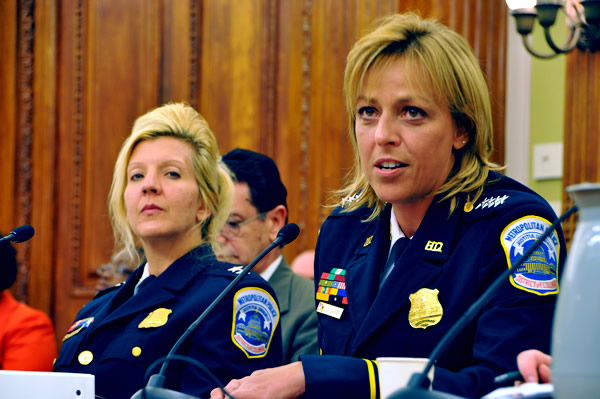Local
Police chief defends fight against anti-LGBT hate crimes
Lanier disputes claim that gay liaison unit ‘dying on vine’

D.C. Police Chief Cathy Lanier told a D.C. Council hearing on Wednesday that the department was making progress in its fight against hate crimes and strongly disputed criticism by the head of the police union that the Gay and Lesbian Liaison Unit was “dying on the vine.”
Her testimony before the Council’s Committee on the Judiciary came after several other witnesses, including D.C. police union chair Kristopher Baumann and LGBT activists, expressed concern that she had seriously weakened the GLLU’s central office, which had once led efforts to fight anti-LGBT hate crimes.
Lanier said some critics have misconstrued her efforts to decentralize and expand the GLLU and the department’s other special liaison units as an effort to discontinue or cut back on the units’ central offices.
“This expansion has not only improved our response to these communities throughout the city, by providing service 24 hours a day, seven days a week,” she said. “But it has also improved our ability to provide consistent information to these communities, while ensuring that information about their needs is integrated into services in each patrol district.”
D.C. Council member Phil Mendelson (D-At-Large), who chairs the committee, said he called the hearing to assess the extent of the city’s hate crimes problem and efforts by the police to address the problem. Other Council members participating in the hearing included Jim Graham (D-Ward 1), Mary Cheh (D-Ward 3) and Muriel Bowser (D-Ward 4).
Graham said he agreed with activists that the GLLU as a whole has been diminished over the past several years. He praised Lanier for doing overall excellent work in fighting crime throughout the city but said she appears to be making changes at the GLLU without “true engagement” from the community the unit is supposed to represent.
“I feel this is slipping away,” Graham said. “It’s a serious loss … This is the message we’re getting.”
Lanier said she could have reached out more to the community on a few issues, including her decision earlier this year to name a civilian administrator as head of the Special Liaison Division, which oversees the GLLU and liaison units working with the Latino, Asian and deaf and hard of hearing communities. But she said members of the GLLU have joined her in expressing disappointment in claims by critics that the unit is not doing as good a job as it has in the past.
Police statistics have shown that D.C. has the nation’s highest rate of anti-LGBT hate crimes, with anti-LGBT bias related crimes making up as much as 70 percent of the city’s overall hate crimes.
Lanier acknowledged that the number of reported hate crimes against the LGBT community has increased significantly in recent years. However, she said it could not be determined whether the actual number of such crimes has increased or whether the increase is due to more people coming forward to report such crimes.
According to D.C. police statistics, in 2010, the total number of reported hate crimes in the city was 68. Out of that total, 35 were crimes targeting gays, lesbians or bisexuals and 10 targeting members of the transgender community.
In 2009, a total of 41 hate crimes were reported, with 30 said to be against gays, lesbians or bisexuals and five based on the victim’s gender identity or expression.
A total of 39 hate crimes were reported in the city in 2008, with 26 said to be against gays, lesbians, or bisexuals and four against transgender persons.
As of June 30 of this year, there were a total of 38 reported hate crimes, according to police data released this week. Out of that total, 14 were based on the victim’s sexual orientation and two were based on the victim’s gender identity or expression.
“It is important to note that because the number of these crimes is relatively low, small shifts in numbers can look disproportionately large in percentages,” Lanier said in her testimony. “Therefore those percentages should be interpreted carefully while also considering the raw numbers.”
[cincopa A4NAAo6gJWke]
A.J. Singletary, president of the D.C. group Gays and Lesbians Opposing Violence, told the committee that Lanier and the department have taken some “laudatory measures” in recent years to combat hate crimes targeting the LGBT community.
But he said the department overall was not properly training officers to recognize and take reports on incidents of anti-LGBT bias that don’t involve a crime of violence but that could lead to violence.
“First, MPD is not documenting anti-LGBT bias incidents effectively, thereby endangering the community and impacting the use of vital resources to prevent hate crimes,” he said.
“Hate incidents – slurs, derogatory terms, or other similar actions – can be tracked and used to target areas of increasing problems across the city,” he told the committee. “We have anecdotal evidence of a disturbing increase in anti-LGBT incidents, including threats, harassment and intimidation.”
Singletary and other witnesses noted that police officials have encouraged citizens to report such incidents to police so that data can be compiled to monitor areas where hate crimes might surface.
“Despite this, GLOV is aware of numerous instances when MPD officers refused to take reports when called and even made the individual feel silly or petty for requesting that the incident be reported,” Singletary said.
Jason Terry, an official with the D.C. Trans Coalition, told the committee that many in the local transgender community lost confidence in police following a December 2010 incident in which an off-duty D.C. police officer assaulted a transgender woman on a downtown street. The woman, Chloe Moore, has accused the officer of assaulting her after she approached him to ask for a light for her cigarette.
The department’s Internal Affairs Division is currently investigating the incident.
Terry and D.C. transgender activist Jeri Hughes told the committee that police officers often assume incorrectly that transgender women, who report being harassed or assaulted because of their gender identity, are prostitutes.
GLOV members and other LGBT activists have complained that Lanier’s decision in 2009 to decentralize the GLLU by assigning affiliate members to the unit from each of the department’s seven police districts diminished the effectiveness of the unit’s central office, which is located in Dupont Circle.
At the time former Mayor Adrian Fenty appointed Lanier as police chief in 2009, there were seven to eight full-time GLLU officers assigned to the central office. The office, created by former Police Chief Charles Ramsey in 2000, became an internationally recognized police entity aimed at addressing issues involving the LGBT community.
Among other things, Ramsey gave GLLU officers full authority to investigate crimes and make arrests as well as to provide public information and outreach to the LGBT community.
Lanier has said she supports those efforts but wanted to expand the unit’s reach throughout the city. She assigned officers from the eight police districts to become affiliate GLLU officers who would continue to perform their regular duties in the districts while being on call to assume GLLU duties as the need arises in their respective districts.
Rick Rosendall, vice president of the Gay and Lesbian Activists Alliance, told the committee he and most other activists fully support the affiliate program. But Rosendall and other activists have said they strongly objected to what they believe has been Lanier’s removal of officers from the GLLU’s central office.
Sources familiar with the GLLU have told the Blade in recent years that the unit’s reputation within the department had diminished and other important units, like the homicide squad, had largely stopped calling on the GLLU for help in gay-related cases.
Lanier has disputed those claims, saying the central unit remains the hub of the GLLU. She told the Council hearing on Wednesday that affiliate members spend at least a month at the central office in a special training program.
She also told the hearing that there are now seven people assigned to the central GLLU office in addition to its part-time commander, Sgt. Carlos Mejia, who also serves as commander of the Latino Liaison Unit.
Maryland
Expanded PrEP access among FreeState Justice’s 2026 legislative priorities
Maryland General Assembly opened on Jan. 14
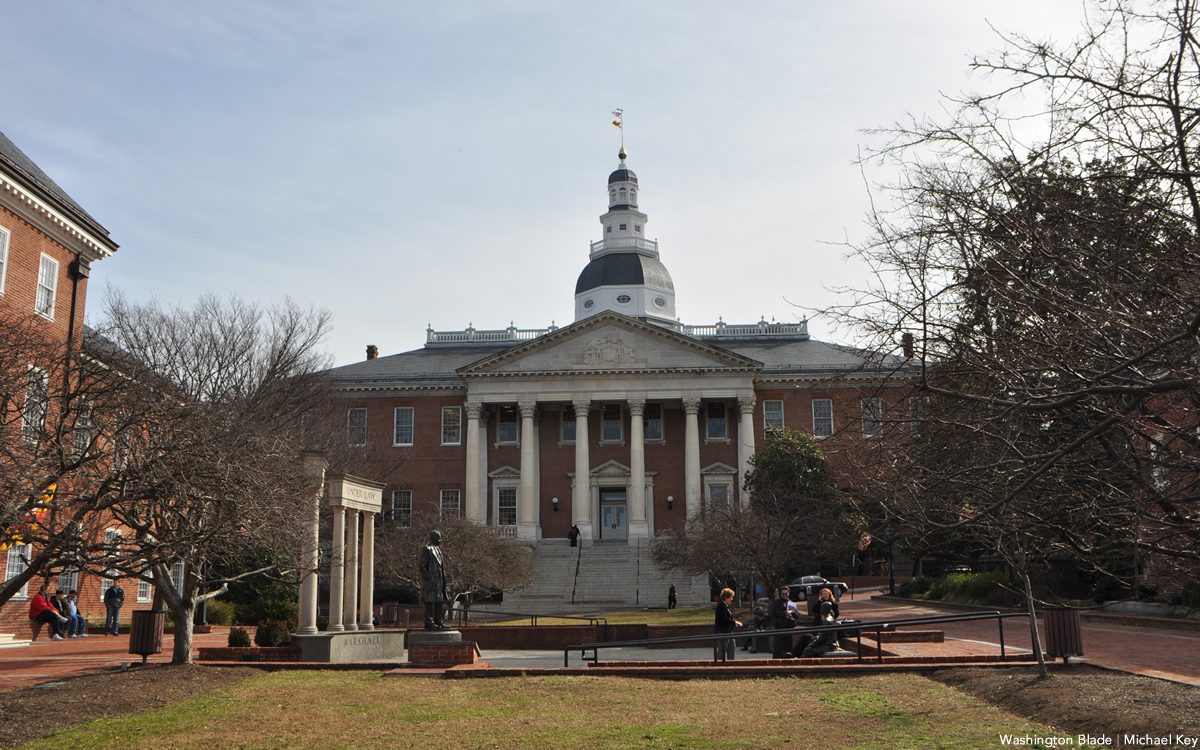
FreeState Justice this week spoke with the Washington Blade about their priorities during this year’s legislative session in Annapolis that began on Jan. 14.
Ronnie L. Taylor, the group’s community director, on Wednesday said the organization continues to fight against discrimination against people with HIV/AIDS. FreeState Justice is specifically championing a bill in the General Assembly that would expand access to PrEP in Maryland.
Taylor said FreeState Justice is working with state Del. Ashanti Martinez (D-Prince George’s County) and state Sen. Clarence Lam (D-Arundel and Howard Counties) on a bill that would expand the “scope of practice for pharmacists in Maryland to distribute PrEP.” The measure does not have a title or a number, but FreeState Justice expects it will have both in the coming weeks.
FreeState Justice has long been involved in the fight to end the criminalization of HIV in the state.
Governor Wes Moore last year signed House Bill 39, which decriminalized HIV in Maryland.
The bill — the Carlton R. Smith Jr. HIV Modernization Act — is named after Carlton Smith, a long-time LGBTQ activist known as the “mayor” of Baltimore’s Mount Vernon neighborhood who died in 2024. FreeState Justice said Marylanders prosecuted under Maryland Health-General Code § 18-601.1 have already seen their convictions expunged.
Taylor said FreeState Justice will continue to “oppose anti anti-LGBTQ legislation” in the General Assembly. Their website later this week will publish a bill tracker.
The General Assembly’s legislative session is expected to end on April 13.
Virginia
From the Pentagon to politics, Bree Fram fighting for LGBTQ rights
Transgender veteran running for Congress in Va.
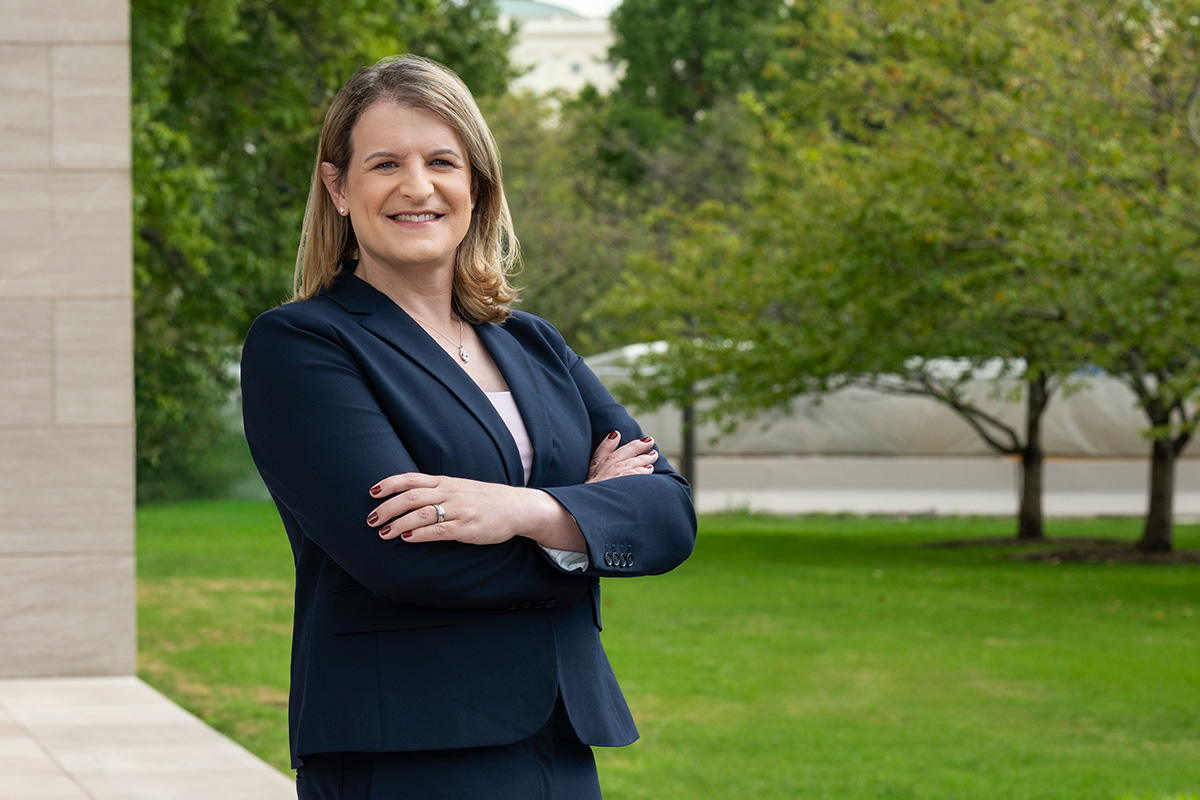
After being ousted from military service, Col. Bree Fram — once the highest-ranking openly transgender officer in the Pentagon — is now running for Congress.
Fram, who lives in Reston, Va., brings more than two decades of public service to her campaign. From the battlefield to the halls of the Pentagon, she spent more than 20 years working inside the federal government, often advocating for LGBTQ people and other marginalized communities from within the system.
Fram spoke with the Washington Blade about her decision to run amid sustained attacks against her — and against the LGBTQ community more broadly — from the Trump-Vance administration and far-right officials.
She said her commitment to public service began more than 22 years ago, shaped in large part by watching the Sept. 11, 2001, terrorist attacks.
“I had grown up expecting that there was this beautiful American peace stretching into the world for the foreseeable future, and that kind of image was shattered,” Fram told the Blade. “I realized that there was a continuous price to be paid to protect our democracy, to protect our freedoms. To be able to play a small part in defending those freedoms was incredibly important to me — to be part of something larger than myself.”
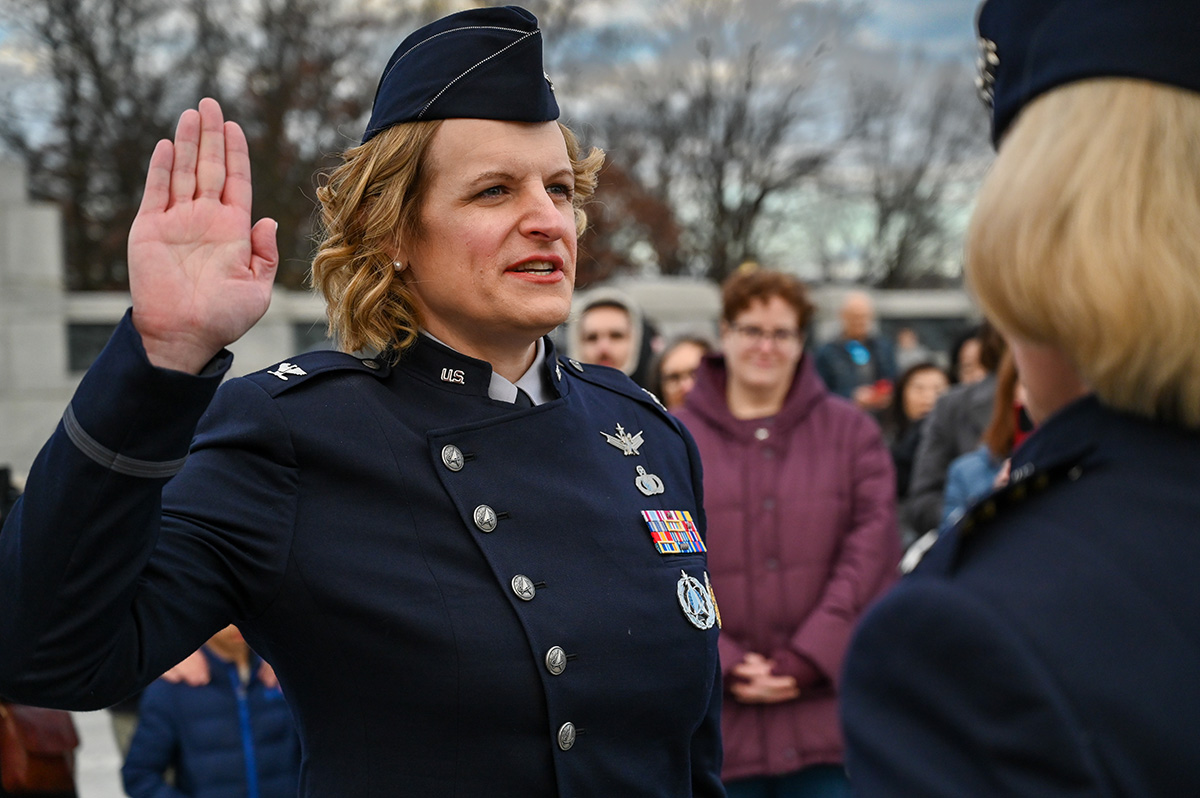
Commissioned through the U.S. Air Force Officer Training School in 2003, Fram served as an astronautical engineer and rose to the rank of colonel in the U.S. Air Force before later serving in the U.S. Space Force. She remained on active duty until 2025, when she was forced out following the Trump-Vance administration’s reinstated ban on trans military service.
Fram has been married for 20 years to her spouse, Peg Fram, and they have two children.
Beyond her military service, Fram has long been involved in advocacy and leadership. She has been a member of SPARTA, a trans military advocacy organization, since 2014, served on its board of directors beginning in 2018, and was president of the organization from 2021-2023.
Most recently, Fram served as chief of the Requirements Integration Division at Headquarters, Space Force, and as co-lead of the Joint Space Requirements Integration Cell in collaboration with the Joint Staff. Previously, she was chief of the Acquisition Policies and Processes Division for the assistant secretary of the Air Force for space acquisition and integration.
Earlier in her career, Fram served as a materiel leader at the Air Force Research Laboratory, overseeing the development of counter-small unmanned aerial systems and offensive cyberspace technologies in support of Pentagon and intelligence community priorities, managing an annual budget exceeding $100 million.
Her previous assignments also included oversight of Air Force security cooperation in four strategically significant Middle Eastern countries and 258 foreign military sales cases valued at $15.79 billion; serving as executive officer to the Air Force director of strategic plans, where she helped integrate the 30-year, $3.6 trillion Air Force Plan; a legislative fellowship on Capitol Hill with then-U.S. Del. Madeleine Bordallo (D-Guam), handling military, veterans, and foreign affairs issues; and a program management role at the National Reconnaissance Office, where she led a $700 million multi-agency engineering and IT contract overseeing more than 500 personnel and supporting $40 billion in assets.
Fram also directed 24/7 worldwide operations and maintenance of mission data processing for space-based and airborne national intelligence assets and co-led the Department of the Air Force’s LGBTQ+ Initiatives Team and Barrier Analysis Working Group from 2023-2025.
She holds a master’s degree from the Air Force Institute of Technology and is a distinguished graduate of the Naval War College. Fram deployed in support of Operation Iraqi Freedom, where she worked on airborne counter-improvised explosive device technologies.
In January, Fram, alongside four other trans military officers, was given a special retirement ceremony by the Human Rights Campaign — a direct result of President Donald Trump’s 2025 Executive Order 14183, titled “Prioritizing Military Excellence and Readiness.” The policy directed the Pentagon to adopt measures prohibiting trans, nonbinary, and gender-nonconforming people from serving in the military.
Under Virginia’s current congressional maps, Fram would challenge Congressman James Walkinshaw in a Democratic primary in the 11th Congressional District, which includes the city of Fairfax and most of Fairfax County. However, the district’s boundaries could change pending ongoing redistricting discussions in the state.
Fram emphasized that her decades working within the executive branch shaped her understanding of what it means to take — and uphold — an oath to the Constitution, even when those in power later forced her out of service solely because of her identity, not her performance.
“Through 23 years of service, I learned what it meant to fulfill that oath to the Constitution, and I wanted to continue serving,” she said. “But when this administration came in and labeled me and others like me ‘dishonorable’ and ‘disciplined liars who lack the humility required for military service,’ it hit hard. When the Supreme Court then agreed to let the administration fire all of us, I had to figure out what would allow me to continue my service in a way that was meaningful and lived up to that oath.”
After being told she would have to retire from a career she describes as her life’s calling, Fram said she began searching for another way to serve — a path that ultimately led her to run for Congress.
“I had done the work over the past couple of decades to understand the America that I believe in, that America I believe we all can be,” Fram said. “That’s where this decision came from. I believe I can fight back and fight forward for Virginians — with the knowledge I have and with a vision of the America we can be.”
That vision, she said, is one that has yet to be fully realized — despite decades of promises from Democratic leaders across all branches of government.
“This is about protecting our fundamental rights — freedom of speech, freedom to assemble, bodily autonomy, a woman’s right to choose, and the ability for queer people to live our best lives,” Fram said. “Right now, our government is throwing barriers up in front of many people. They’re strengthening them, building walls higher, and actively damaging lives.”
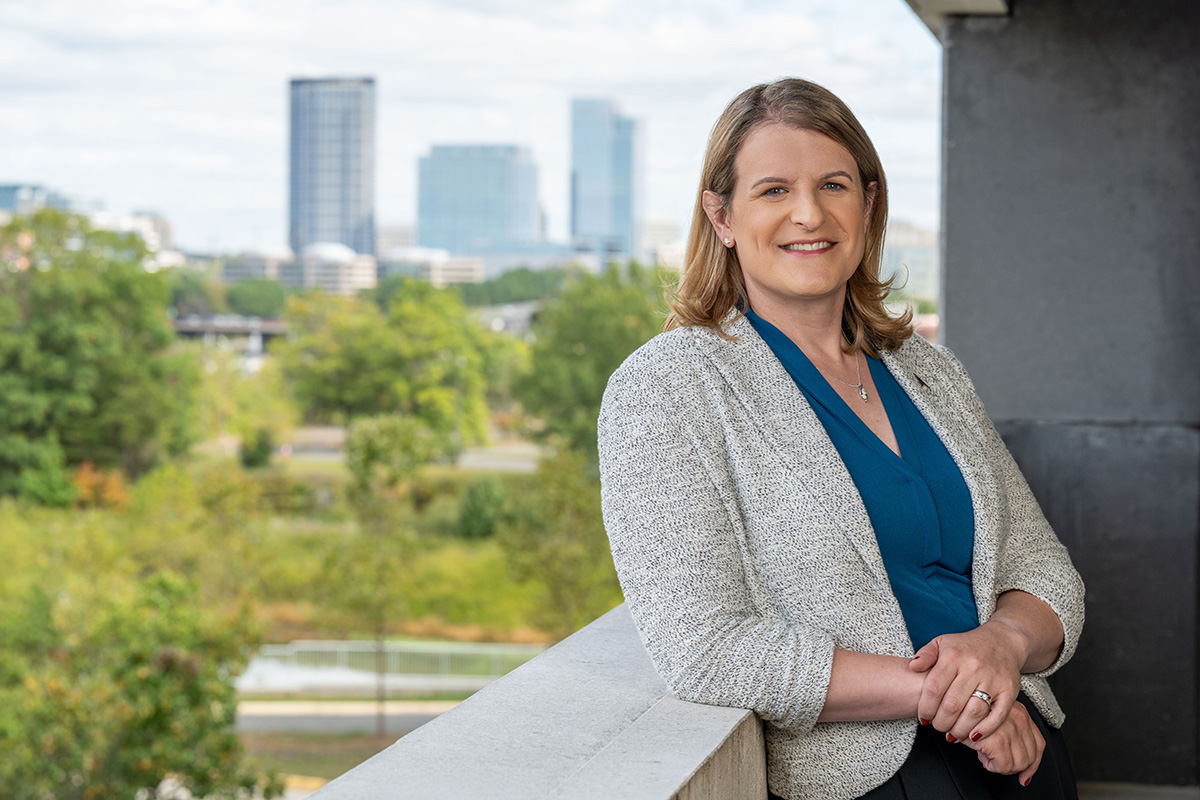
Fram said her leadership philosophy was shaped by watching strong, effective leaders during her time in the Air Force and Space Force — leaders who reinforced her belief that true leadership means expanding opportunity, not restricting it.
“Leadership is about tearing barriers down — not climbing over them and forcing others to suffer through the same things,” she said. “It’s about making sure the people coming up behind us have even more opportunity to go further, faster. How do we be better tomorrow than we are today? How do we fulfill our founding promise of life, liberty, and the pursuit of happiness?”
One way Fram said Congress could help dismantle those barriers is by passing the Equal Rights Amendment, enshrining constitutional protections for all people — particularly LGBTQ Americans.
“Getting the Equal Rights Amendment into the Constitution is absolutely critical to the future of queer rights,” she said. “Voting rights must also be clearly protected.”
Protecting democracy itself is also among her top priorities, Fram said.
“We need to take control of the House so we can put real checks on this administration,” she said. “That allows the American people to see how this administration is actively making their lives worse and less affordable — and it’s how we ultimately throw them out and get back to making life better.”
Fram said her experience working under four presidents — including during Trump’s first term — reinforced her belief that opposition to efforts curtailing civil liberties is essential.
“The primary thing we can do to protect democracy is to get rid of this administration,” she said. “Taking control of the House gives us true investigative power. Under every rock, there is likely an impeachable offense because they are failing to faithfully execute the laws of the United States.”
For her, the message Trump is sending is clear — he and others close-minded to the LGBTQ community are threatened by the possibility of what someone truly dedicated to service can become.
“One of the reasons this administration had to throw us out and silence us was because we were an example of what was possible. We shined so brightly by meeting or exceeding every standard that they couldn’t hide us away by any other means except kicking us out.”
Fram acknowledged that her identity has been a political target since 2016, but said those attacks have never been grounded in her ability to lead or accomplish complex missions over more than two decades of service.
“If others want to attack me on my identity, I welcome it,” she said. “I’m focused on whether people can afford groceries or feel safe in their communities.”
“I’m happy to be a lightning rod for those kinds of attacks,” she added. “If it allows Democrats to advance an agenda that makes life better for Americans, they can come after me all day long. They attacked me while I was in the military, before I was ever running for office.”
On policy, Fram said affordability, health care, and safety are at the center of her agenda.
“No one should be afraid to go to the doctor or fear surprise medical bills that put them into debt,” she said. “Every American deserves access to affordable, high-quality health care.”
She also emphasized a willingness to work across party lines — even with those who previously politicized her identity — if it means delivering results for constituents.
“If someone wants to work together to make people’s lives better, I’ll work with them,” she said. “If they want to come after me based on who I am, they can waste their energy on that.”
Asked how she defines hope in the current political moment, Fram rejected the idea of passive optimism.
“Hope isn’t naive optimism,” she said. “Hope is doing the work — engaging people and bending the moral arc of the universe toward justice.”
She added that representation itself can be transformative.
“Just being in Congress changes the narrative,” Fram said. “It lets a kid say, ‘Oh my God — I could do that too.’”
District of Columbia
Eleanor Holmes Norton ends 2026 reelection campaign
Longtime LGBTQ rights supporter introduced, backed LGBTQ-supportive legislation
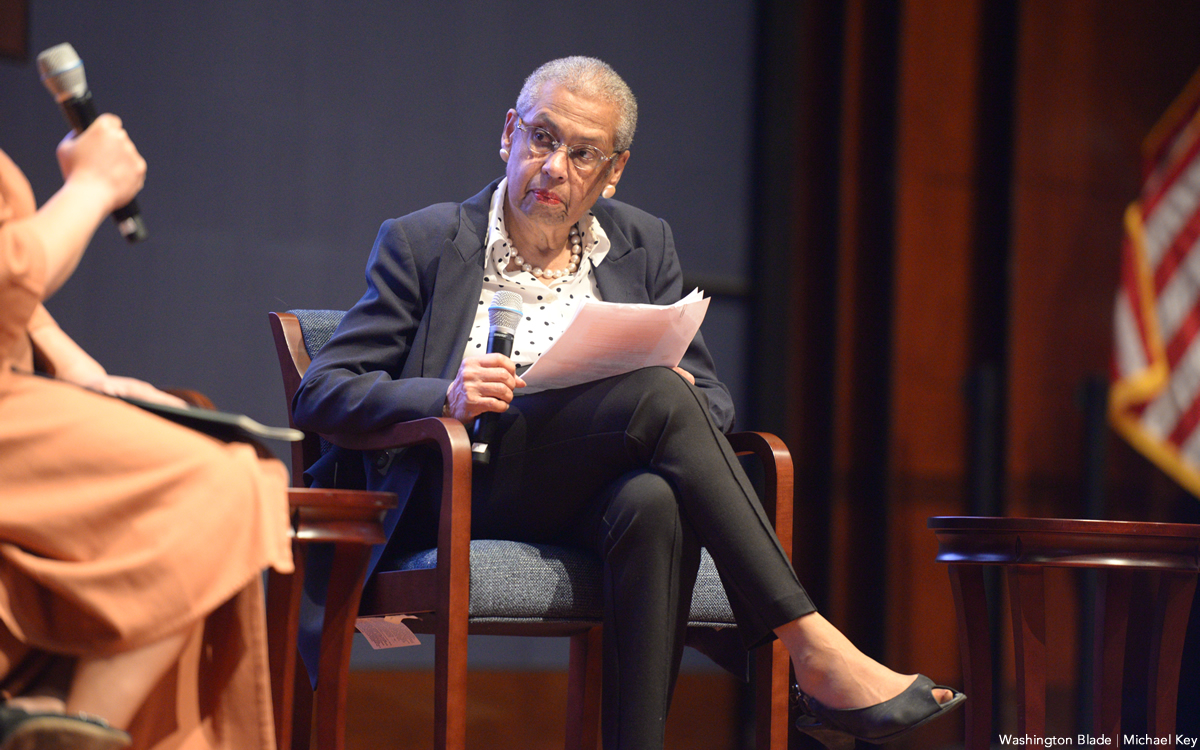
The reelection campaign for D.C. Congressional Delegate Eleanor Holmes Norton, who has been an outspoken supporter of LGBTQ rights since first taking office in 1991, filed a termination report on Jan. 25 with the Federal Elections Commission, indicating she will not run for a 19th term in the U.S. House of Representatives.
Norton’s decision not to run again, which was first reported by the online news publication NOTUS, comes at a time when many of her longtime supporters questioned her ability to continue in office at the age of 88.
NOTUS cited local political observers who pointed out that Norton has in the past year or two curtailed public appearances and, according to critics, has not taken sufficient action to oppose efforts by the Trump-Vance administration and Republican members of Congress to curtail D.C.’s limited home rule government.
Those same critics, however, have praised Norton for her 35-year tenure as the city’s non-voting delegate in the House and as a champion for a wide range of issues of interest to D.C. LGBTQ rights advocates have also praised her longstanding support for LGBTQ rights issues both locally and nationally.
D.C. gay Democratic Party activist Cartwright Moore, who has worked on Norton’s congressional staff from the time she first took office in 1991 until his retirement in 2021, points out that Norton’s role as a staunch LGBTQ ally dates back to the 1970s when she served as head of the New York City Commission on Human Rights.
“The congresswoman is a great person,” Moore told the Washington Blade in recounting his 30 years working on her staff, most recently as senior case worker dealing with local constituent issues.
Norton has been among the lead co-sponsors and outspoken supporters of LGBTQ rights legislation introduced in Congress since first taking office, including the currently pending Equality Act, which would ban employment discrimination based on sexual orientation and gender identity.
She has introduced multiple LGBTQ supportive bills, including her most recent bill introduced in June 2025, the District of Columbia Local Juror Non-Discrimination Act, which would ban D.C. residents from being disqualified from jury service in D.C. Superior Court based on their sexual orientation or gender identity.
For many years, Norton has marched in the city’s annual Pride parade.
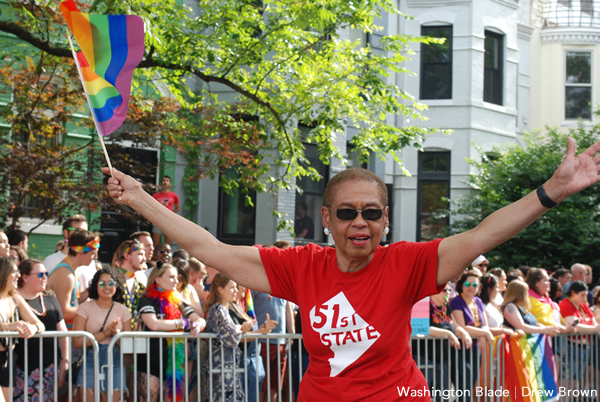
Her decision not to run for another term in office also comes at a time when, for the first time in many years, several prominent candidates emerged to run against her in the June 2026 D.C. Democratic primary. Among them are D.C. Council members Robert White (D-At-Large) and Brooke Pinto (D-Ward 2).
Others who have announced their candidacy for Norton’s seat include Jacque Patterson, president of the D.C. State Board of Education; Kinney Zalesne, a local Democratic party activist; and Trent Holbrook, who until recently served as Norton’s senior legislative counsel.
“For more than three decades, Congresswoman Norton has been Washington, D.C.’s steadfast warrior on Capitol Hill, a relentless advocate for our city’s right to self-determination, full democracy, and statehood,” said Oye Owolewa, the city’s elected U.S. shadow representative in a statement. “At every pivotal moment, she has stood firm on behalf of D.C. residents, never wavering in her pursuit of justice, equity, and meaningful representation for a city too often denied its rightful voice,” he said.
A spokesperson for Norton’s soon-to-close re-election campaign couldn’t immediately be reached for a comment by Norton on her decision not to seek another term in office.

